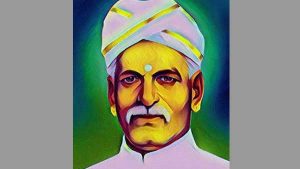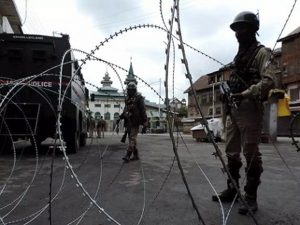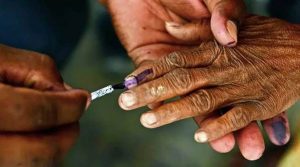Daily Current Affairs for Government Exams:
Today Current Affairs: 29th August 2020 for UPSC IAS exams, State PSC exams, SSC CGL, State SSC, RRB, Railways, Banking Exam & IBPS, etc
Table of Contents
Contents:
- Mahatma Ayyankali 157th Birth Anniversary
- New rules for administration in the Union Territory of Jammu and Kashmir:
- The common electoral roll for elections
- Pradhan Mantri Jan-Dhan Yojana (PMJDY) – National Mission for Financial Inclusion, completed its six years of successful implementation.
- Other important current affairs:
1.Mahatma Ayyankali 157th Birth Anniversary:

Born on August 28th, 1863 in a small village in the princely state of Travancore, now within the south of the modern-day nation of Kerala,
- The caste discrimination he faced as a child turned him into a leader of an anti-caste movement and who later fought for basic rights including access to public spaces and entry to schools.
- Mahatma Gandhi called Ayyankali as ‘Pulaya king’. Indira Gandhi described him as ‘India’s greatest son’.
- Ayyankali in 1893 rode an ox-cart challenging the ‘ban’ on untouchables from accessing public roads by caste-Hindus.
- He also led a rally to assert the rights of ‘untouchables’ at Balaramapuram. The walk Ayyankali took came to be known as ‘walk for freedom’ and the consequent riots as ‘Chaliyar riots’.
- Ayyankali efforts influenced many changes that improved social wellbeing of those people, who are today referred to as Dalits.
- Ayyankali became a stated protestor for Pulayar rights. Because of the protests led through Ayyankali, in 1907 a decree turned into issued to confess students from the untouchable network to government schools.
- Inspired by Sree Narayana Guru, a social reformer from Ezhava caste, Ayyankali started Sadhu Jana Paripalana Sangham (association for the protection of the poor) which later raised funds to start their own schools.
2.New rules for administration in the Union Territory of Jammu and Kashmir:

The Union Home Ministry notified new rules for administration in the Union Territory of Jammu and Kashmir (J&K) that specify the functions of the Lieutenant-Governor (L-G) and the Council of Ministers.
- According to the transaction of business rules, “police, public order, All India Services and anti-corruption” will fall under the executive functions of the L-G, implying that the Chief Minister or the Council of Ministers will have no say in their functioning.
- The rules say that matters which affect the interest of any minority community, the Scheduled Castes, the Scheduled Tribes, and the Backward Classes “shall essentially be submitted to the Lieutenant Governor through the Chief Secretary, under intimation to the Chief Minister, before issuing any orders”.
- The Council of Ministers, led by the CM, will decide service matters of non-All India Services officers, proposal to impose a new tax, land revenue, sale grant or lease of government property, reconstituting departments or offices, and draft legislation.
- However, in case of difference of opinion between the L-G and a Minister, when no agreement could be reached even after a month, the “decision of the Lieutenant Governor shall be deemed to have been accepted by the Council of Ministers.”
- On August 6, 2019, Parliament read down Article 370 of the Constitution revoking the special status of J&K and bifurcated and downgraded the State into the Union Territories of J&K and Ladakh, with the former having a Legislative Assembly.
- J&K has been without a Chief Minister since June 2018. According to the requirements of the J&K Reorganisation Act, 2019, fresh elections will be held after the delimitation exercise is completed next year.
3.The common electoral roll for elections:

The Prime Minister’s Office held a meeting with representatives of the Election Commission and the Law Ministry to discuss the possibility of having a common electoral roll for elections to the panchayat, municipality, state assembly and the Lok Sabha.
- In many states, the voters’ list for the panchayat and municipality elections is different from the one used for Parliament and Assembly elections.
- This is because the supervision and conduct of elections in our country are entrusted with two constitutional authorities — the Election Commission (EC) of India and the State Election Commissions (SECs).
- Set up in 1950, the EC is charged with the responsibility of conducting polls to the offices of the President and Vice-President of India, and to Parliament, the state assemblies and the legislative councils.
- The SECs, on the other hand, supervise municipal and panchayat elections. They are free to prepare their own electoral rolls for local body elections, and this exercise does not have to be coordinated with the EC. Each SEC is governed by a separate state Act.
- However, some state laws allow the SEC to borrow and use the EC’s voter’s rolls in toto for the local body elections.
- Currently, all states, except Uttar Pradesh, Uttarakhand, Odisha, Assam, Madhya Pradesh, Kerala, Odisha, Assam, Arunachal Pradesh, Nagaland and the Union Territory of Jammu and Kashmir, adopt EC’s rolls for local body polls.
- The pitch for a single voters list is not new.
- The Law Commission recommended it in its 255th report in 2015.
- The EC too adopted a similar stance in 1999 and 2004.
4. Pradhan Mantri Jan-Dhan Yojana (PMJDY) – National Mission for Financial Inclusion, completed its six years of successful implementation.

While launching the programme on 28th August 2014, the Prime Minister had described the occasion as a festival to celebrate the liberation of the poor from a vicious cycle of poverty.
- A key initiative towards the commitment of financial inclusion is the Pradhan Mantri Jan Dhan Yojna (PMJDY).
PMJDY Accounts:
- Total Number of PMJDY Accounts (as on 19th August 2020): 40.35 Crore; Rural PMJDY accounts: 63.6%, Women PMJDY accounts: 55.2%
- During the first year of the scheme 17.90 crores PMJDY accounts were opened.
- Continuous increase in no of accounts under PMJDY.
Operative PMJDY Accounts:
- As per extant RBI guidelines, a PMJDY account is treated as inoperative if there are no customer induced transactions in the account for over a period of two years.
- Out of a total of 40.35 crore PMJDY accounts, 34.81 crores (86.3%) are operative.
Deposits under PMJDY accounts:
- Total deposit balances under PMJDY Accounts stand at Rs. 1.31 lakh crore.
- Deposits have increased about 5.7 times with an increase in accounts 2.3 times between 2015 to 2020.
- Rupay Card issued to PMJDY account holders:
- Total RuPay cards issued to PMJDY account holders: 29.75 Crore
Jan Dhan Darshak App:
- A mobile application was launched to provide a citizen-centric platform for locating banking touchpoints such as bank branches, ATMs, Bank Mitras, Post Offices, etc.
- This app is also being used for identifying villages that are not served by banking touchpoints within 5 km. The efforts have resulted in a significant decrease in the number of such villages.
Pradhan Mantri Garib Kalyan Package (PMGKP) for PMJDY women beneficiaries:
- An amount of Rs. 500/- per month for three months (April’ 20 to June’ 20), was credited to the accounts of women account holders under Pradhan Mantri Jan Dhan Yojana (PMJDY).
Pradhan Mantri Jan-Dhan Yojana (PMJDY) is National Mission for Financial Inclusion to ensure access to financial services, namely, Banking/Savings & Deposit Accounts, Remittance, Credit, Insurance, Pension in an affordable manner.
- Objectives:
- Ensure access to financial products & services at an affordable cost.
- Use of technology to lower cost & widen reach.
Other important current affairs:
1.The Supreme Court has held that States are empowered under the Disaster Management Act to override the University Grants Commission (UGC) exam guidelines in order to protect human lives amid the COVID-19 pandemic.
- UGC had on July 6 issued guidelines based on the recommendations of the R.C. Kuhad Expert Committee.
- They provided three modes of examination – pen and paper, online and blended (both physical and online).
- A “special chance” was also given to students unable to take the exams.
- Following this, a batch of petitions were filed in the court against the direction to hold exams as per the UGC guidelines.
- The petitioners also contended that the revised guidelines violate Article 14 on two counts — by fixing a date for the completion of exams for the entire country irrespective of the situation in different parts and discriminating between final and first/second-year students.
- The judgment:
- Universities and other institutions of higher education will have to conduct the final-year exams and “cannot” promote students on the basis of internal assessment or other criteria.
- However, states and Union Territories, which may have postponed the exams in view of the COVID outbreak, can approach the University Grants Commission (UGC) for extension of the September 30 deadline.
2. The Punjab Assembly passed a resolution and rejected the Centre’s recent farm ordinances and the proposed Electricity (Amendment) Bill 2020.
- The ordinances include:
- Farmers’ Produce Trade and Commerce (Promotion and Facilitation) Ordinance, 2020
Farmers (Empowerment and Protection) Agreement on Price Assurance and Farm Services Ordinance, 2020, Essential Commodities (Amendment) Ordinance, 2020. - These ordinances were a part of the third tranche of the economic package announced under Atmanirbhar Bharat Abhiyan to counter the Covid-19 pandemic.
- They are expected to allow free movement of agricultural produce between states and let the farmers decide to whom they want to sell their crops.
- The Electricity (Amendment) Bill 2020 centralizes the power sector through establishment of Electricity Contract Enforcement Authority.
- Recognition of franchisees and sublicensees under the Bill might open the sector to private players.
- Farmers’ Produce Trade and Commerce (Promotion and Facilitation) Ordinance, 2020
- Criticism:
- Source of Income for State Governments: One of the Ordinance prohibits state governments from levying any market fee, cess or levy on farmers, traders, and electronic trading platforms for any trade under the Ordinance.
- State governments would lose incomes from Agricultural Produce Market Committee-controlled trading.
- Usurping State Powers: These ordinances are targeted at usurping state powers, and overriding state laws and market committees.
4. Taliban delegation visited Pakistan to discuss the way forward in the Afghan peace process.
- The Taliban delegation was led by their political chief Mullah Abdul Ghani Baradar.
- Pakistan Stand:
- It had played a facilitating role on the Afghan issue, which led to a peace agreement between the U.S. and the Taliban.
- The next step it seeks is intra-Afghan peace dialogue, to which Afghanistan has also agreed.
- It has reiterated its commitment to further deepen the ties with Afghanistan and enhance cooperation in all fields.
- Issues Involved:
- The Taliban visited Pakistan in the backdrop of stalled intra-Afghan peace dialogue over the issue of prisoners released.
- The Taliban also want to speed up the intra-Afghan peace dialogue.
- Earlier, to resolve the issue the Afghanistan government had convened Loya Jirga (grand assembly), which also approved the release of prisoners and further the peace process.
5. On the 6th Foundation Day (27th August 2020) of the Association of Renewable Energy Agencies of States (AREAS), the government has launched a website and telephone directory for AREAS.
- Agenda Behind AREAS: State Nodal Agencies (SNAs) for Renewable Energy (RE) interact and learn from each other’s experiences and also share their best practices and knowledge regarding technologies and schemes/programs.
- Members: The Union Minister for New & Renewable Energy (NRE) is the Patron of the Association and Secretary, MNRE is the ex-officio President of the Association. All SNAs are members of the Association.
- Formation: It got registered under the Society Registration Act, 1860 on 27th August 2014.
6. The Lakshadweep Administration had embarked on the ‘Pilot project on Biological Control of Rodents (Rats) by Using Barn Owls (Tyto alba) in Kavaratti Island’ after studies revealed the shocking extent of damage caused by rats to the island’s coconut yield and economy
- Scientific name: Tyto alba.
- Common name: Common barn owl.
- Distribution: It is the most widely distributed species of owl. It is found almost everywhere in the world except polar and desert regions, in Asia north of the Himalayas, most of Indonesia, and some Pacific islands.
- Physical description: The plumage on head and back is a mottled shade of grey or brown, the underparts vary from white to brown and are sometimes speckled with dark markings. The face is characteristically heart-shaped and is white in most subspecies.
- Diet: Barn owls specialize in hunting animals on the ground and nearly all of their food consists of small mammals which they locate by sound, their hearing being very acute.
- IUCN status: Least Concern.
- Cultural significance: The Barn Owl is respected as the acolyte of the Goddess Chamunda in Karnataka. In Bengal, it is revered as the carrier of Lakshmi, the deity of wealth.
7.14th India-Singapore Defence Policy Dialogue (DPD) was held via video conferencing.:
- It was co-chaired by Defence Secretary Dr. Ajay Kumar and Permanent Secretary (Defence), Singapore Mr. Chan Heng Kee.
- Both sides held discussions on a number of issues of bilateral defense engagements between India and Singapore.
- At the end of the DPD, the Implementing Arrangement on Humanitarian Assistance & Disaster Relief (HADR) between India and Singapore was also signed.
8. Union Minister for Electronics and Information Technology has launched “Chunauti”- Next Generation Startup Challenge Contest to further boost startups and software products with special focus on Tier-II towns of the country.
- The government has earmarked a budget of over 95 crore rupees over a period of three years for this program.
- It aims at identifying around three hundred startups working in identified areas and providing them seed funds of up to 25 lakh rupees and other facilities.
- Under this challenge, the Ministry of Electronics and IT will invite startups in the areas of work including Edu Tech, Agri Tech, and FinTech solutions for masses, Supply Chain and Logistics Management, Infrastructure, Medical Healthcare as well as jobs and skilling.
9. The Department of Economic Affairs (DEA), Ministry of Finance, Government of India, in collaboration with the United Nations Development Programme India launched the Sustainable Finance Collaborative on 26th August 2020.
- The consultation was held on 26th, 27th, and 28th August over the virtual platform which brought forth thematic discussions around some key aspects of Sustainable Finance.
- The Collaborative saw a host of thematic discussions centred around the broad scope of Sustainable Finance architecture in India.
- It included dialogues on barriers to deploying new and innovative financing such as impact investing, role of blended finance instruments, green finance instruments for sustainable development, need for the taxonomy of environmentally sustainable activities, etc.
10. The European Union has urged Turkey to halt its drilling activities in contested waters in the Mediterranean and ordered EU officials to speed up work aimed at blacklisting some Turkish officials linked to the energy exploration.
- Over recent weeks, tensions have been rising in the waters of the Eastern Mediterranean, prompted by what seems like a simple rivalry over energy resources.
- Turkey has pursued an aggressive gas exploration effort, its research vessel heavily protected by warships of the Turkish Navy.
- There have been encounters with rival Greek vessels and a third Nato country, France, has become involved, siding with the Greeks.
- These tensions also highlight another shift in the region – the decline of US power.




